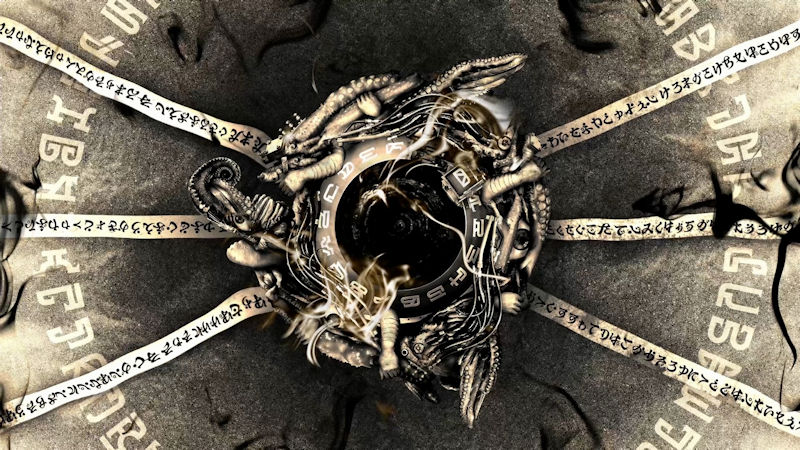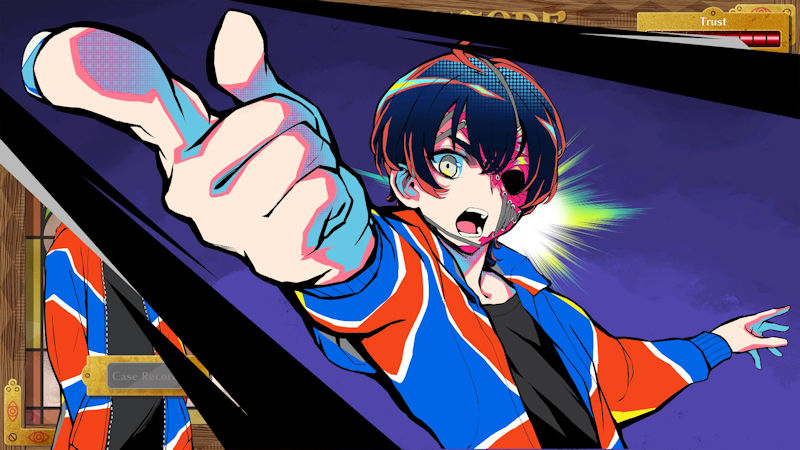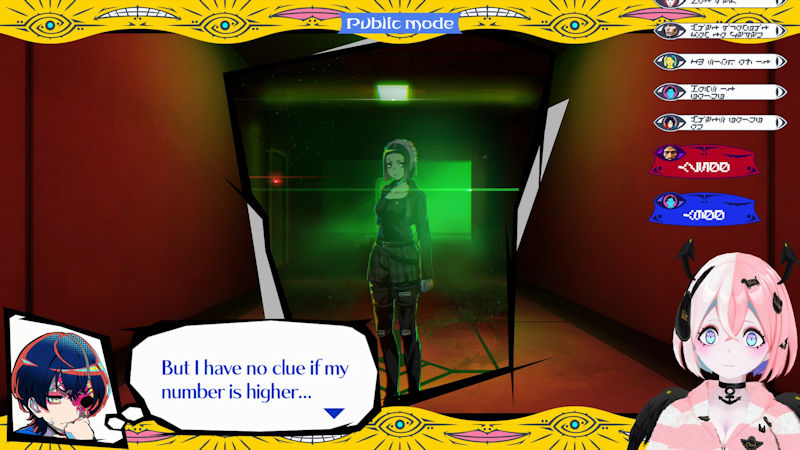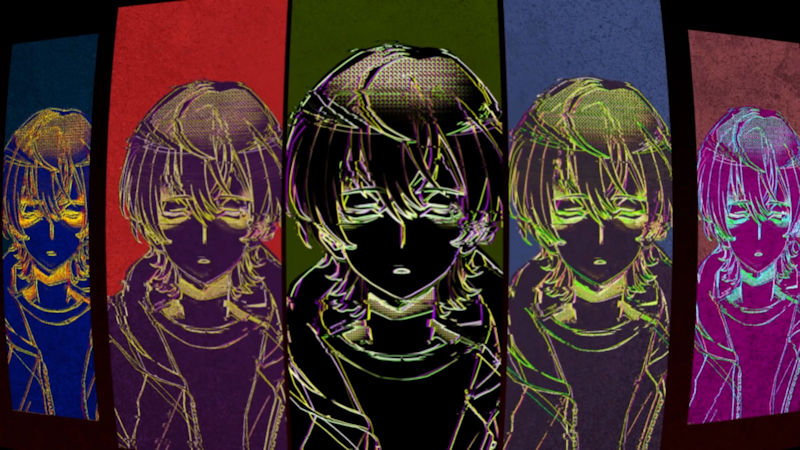
Written by Majkol Robuschi on 17 Sep 2025
Distributor Spike Chunsoft • Price 39.99
Visual novel fans will likely already know that Tookyo Games is the studio founded in 2017 by Kazutaka Kodaka and Kotaro Uchikoshi. The creators of Danganronpa and the Zero Escape trilogy have long been considered two of the most influential and iconic writers in the genre, though their more recent works have yet to truly break into the mainstream imagination.
We recently covered The Hundred Line: Last Defense Academy in a review by our own Ross Locksley, who praised its RPG mechanics and ambitious storytelling. Today, however, we turn our attention to Shuten Order, the latest project from Tookyo Games in collaboration with yet another developer brought in for support work; this time the little-known studio Neilo.
In this game, players step into the role of Rei, a young, androgynous girl who wakes up in a hotel room with no memory of who she is or how she got there. The situation quickly escalates when she encounters two mysterious angelic beings, Himeru and Mikotoru, who explain the truth: Rei has recently been murdered, but God has granted her a miracle. She is brought back to life in a temporary body for three days, tasked with the daunting mission of discovering her killer. There’s just one catch, and it’s a big one! If Rei wants to reclaim her memories and return to life, she must perform a religious ritual: force her murderer to confess, and then end their life.
That would already be difficult enough, especially for a protagonist suffering from an amnesia so severe she can’t even recall her own name. But the task becomes seemingly impossible when Rei becomes aware that she is not in just any place, but in the city-state of Shuten: a theocratic community that prays every day in the hope that humanity will cease to exist, and whose power is concentrated in the hands of an enigmatic founder and his five ministers—these five oligarchs are revealed to be the suspects of the crime.
The powers of Justice, Health, Education, Science, and Security are each represented by a powerful figure Rei must investigate in order to uncover the truth behind her murder—and the future hinted at by the ominous countdown displayed on every building in Shuten, as the story opens with the unsettling line: “168 remaining until the end of the world.”
 "The Power of God" is the special skill Rei relies on to escape dangers in her adventure, but what is its origin?
"The Power of God" is the special skill Rei relies on to escape dangers in her adventure, but what is its origin?
From its very premise, Shuten Order establishes itself as a compelling adventure game. Not only does it embrace the mystery surrounding Rei’s identity, but it sets the entire narrative in a grotesque utopia.
The game’s main selling point is that it features five distinct routes, each with its own unique gameplay approach. This was interpreted in the West as the announcement of a video game that combined five different video game genres into one; the reality of the facts—which can also be verified on the official website, where it talks about “Five Adventure games combined into one”—is that the title positions itself as a reflection on the aesthetic and philological conventions of the "adventure game" genre alone.
It’s worth clarifying here: “visual novel” is a distinctly Western, English-centric term, not typically used in Japanese game culture. In Japan, “adventure game” is a broader label that includes a wide variety of experiences, even those that Western audiences might dismiss as text-heavy. This is why, despite incorporating mechanics and aesthetics reminiscent of other genres, Shuten Order remains at its core an investigative visual novel interspersed with short minigames. This, naturally, places the production's emphasis on the quality of the screenplay and character characterization, considering the gameplay hybridizations as mere aesthetic divertissements that play the role of little more than a stylistic exercise.

The investigative route is so reminiscent of Danganronpa that I almost expected Monokuma to make a cameo!
Shuten Order is, in many ways, a love letter to the adventure genre, packed with formal nods to classics. it ranges from investigative adventure in the style of Danganronpa, with multiple verbal confrontation sessions akin to "class trials," to sections where text covers the majority of the screen, following the aesthetic conventions of ensemble sound novels typical of games developed by the Japanese software house Chunsoft during the 90s, such as classics like Machi or the more recent 428: Shibuya Scramble, where the narrative develops by following the point of view of multiple characters and their stories intertwine and obstruct each other, asking the player to put the events in order to allow the plot to reach a conclusion.
One route even borrows the iconic “bomb” mechanics from Konami’s dating sim Tokimeki Memorial, where a ticking bomb icon signals the importance of meeting a girl before her interest fades (or, in Shuten Order’s case, goes full Doki Doki Literature Club!). Another evokes the escape-room-style puzzles of 999: Nine Hours, Nine Persons, Nine Doors, complete with labyrinths to explore, and puzzles to solve, while yet another plunges into stealth survival horror, where Rei must evade unbeatable enemies in 3D exploration sequences reminiscent of Corpse Party 2: Dead Patient.
These homages don’t stop at gameplay, either—the interface itself shifts to match each genre, with careful attention to detail. Still, while the idea is clever, the execution is less consistent. These “multi-genre” sections, though short and superficial, often disrupt the flow of the story, inserting weak or forgettable gameplay sessions that can feel more like an obstacle to the plot's progression than an enrichment of the experience. For players unaccustomed to multi-perspective sound novels, the Science Minister Teko’s route, in particular, may test patience—its branching paths can force repeated replays of large sections if the wrong choices are made. To ease this, the game does allow saving at any point and offers fast-forwarding through text, partly mitigating the drawbacks of an aesthetic fidelity to the reference genre that has nothing to do with the fluidity and snappiness of modern visual novels that the Western audience is accustomed to (and to which Shuten Order itself belongs).

The whole UI changes according to the adventure game "genre" simulated by the game. This time, including a live streamer commenting on Rei's adventure.
That said, Shuten Order firmly asserts its identity as an adventure game, weaving a non-linear narrative across its five routes. Each route allows Rei to investigate one potential culprit, uncovering their past and motivations, while also shedding light on the mysteries of Shuten itself and the origins of its disturbing cult. Each adventure also allows for more light to be shed on the reality surrounding the city-state of Shuten and the origins of the cult practiced within it, with extremely surprising twists coinciding with the narrative climax of each scenario. Precisely because of this non-linear nature, each route introduces concepts and information that may have already been assimilated by playing others beforehand, and in a way, a sense of redundancy is almost guaranteed when engaging in long back-to-back gaming sessions. The advice is to dedicate as much time as possible to the game, but to let some time pass between completing each route to avoid falling into the feeling of circling around a truth that is already well known.
Once all five main routes are complete, players unlock the final scenario, where everything learned about the suspects and the city of Shuten comes together. This route is by far the most satisfying: the previous chapters drip-feed worldbuilding without ever painting the full picture, and here the mystery of Rei’s death is finally revealed—culminating in one of two possible endings. Importantly, neither is presented as a “true” or “false”. Both are valid in their own way, pushing back against the traditional “good” and “bad” end dichotomy and instead embracing an iterative approach to storytelling—similar to the ideas already explored in the interesting The Hundred Line: Last Defense Academy.
The quality of the writing is consistently strong across all routes, even with different authors handling each one—a common practice in lengthy visual novels. While Kodaka has been the face of the game’s promotion (for obvious reasons, given his good reputation), much of the text is actually penned by Takekuni Kitayama and Takumi Nakazawa, both respected for their work on titles like Master Detective Archives: RAINCODE and Ever 17 - The Out of Infinity.

Rei's journey is far from being simple, but she can count on her angels companion.
Unfortunately, the English localization suffers. While serviceable overall, it is marred by translation problems and awkward phrasing, with notable typos and insertion of texts that sometimes spill out of the graphical text boxes. Similarly, elements written in graphics have not been translated but only subtitled, resulting in huge animated Japanese-language writings on screen with small subtitles translating their meaning. A more than acceptable compromise, but the reason that pushed the adaptation approach—typically of rather high quality in previous titles by Kodaka and co.—to change in this way is unclear.
Where Shuten Order shines brightest is in its art direction. The visuals are striking, with polished cutscenes and bold character designs by Simadoriru—an artist who previously worked on Danganronpa but takes on the role of lead artist here for the first time. The designs pop with fluorescent, vibrant colors and diverse physiques, resulting in a cast of memorable and charismatic characters. Their appeal is further enhanced by a stellar Japanese voice cast, highlighted by Mitsuki Saiga (Tiz in Bravely Default, Maria Ross in Fullmetal Alchemist) as Rei, and Daisuke Ono (Jotaro Kujo in JoJo’s Bizarre Adventure, Erwin Smith in Attack on Titan) as the Minister of Justice. Completing the package, as always in Tookyo Games productions, is the return of composer Masafumi Takada, whose energetic electronic soundtrack recalls his iconic work on Danganronpa and No More Heroes.
In conclusion, Shuten Order is not a perfect title: its gameplay hybridizations do not go beyond mere stylistic exercises, and some localization choices penalize the experience for the Western audience. However, it remains an ambitious work deeply aware of its roots, capable of both paying homage to and deconstructing the tradition of the Japanese adventure game. The charisma of the cast, the strength of the writing, and the vibrant artistic direction make it an essential title for anyone who wants to explore the narrative potential of the medium, confirming Tookyo Games as a reality still capable of proposing courageous, authorial, and thought-provoking visual novels today.

Majkol (aka Zaru) is an Italian queer writer (he/him – they/them) who has been immersed in the world of video game journalism for almost two decades. With a deep-seated love for anime and manga shaping his tastes and passion, he brings a blend of critical insight and heartfelt enthusiasm to his work, celebrating stories that challenge norms and embrace diversity. Find him on his blog, Also sprach zaru_thustra.
posted by Ross Locksley on 16 Dec 2025
posted by Ross Locksley on 10 Dec 2025
posted by Ross Locksley on 01 Dec 2025
posted by Ross Locksley on 28 Nov 2025
posted by Ross Locksley on 22 Nov 2025
posted by Ross Locksley on 22 Nov 2025
posted by Ross Locksley on 13 Nov 2025
posted by Ross Locksley on 07 Nov 2025